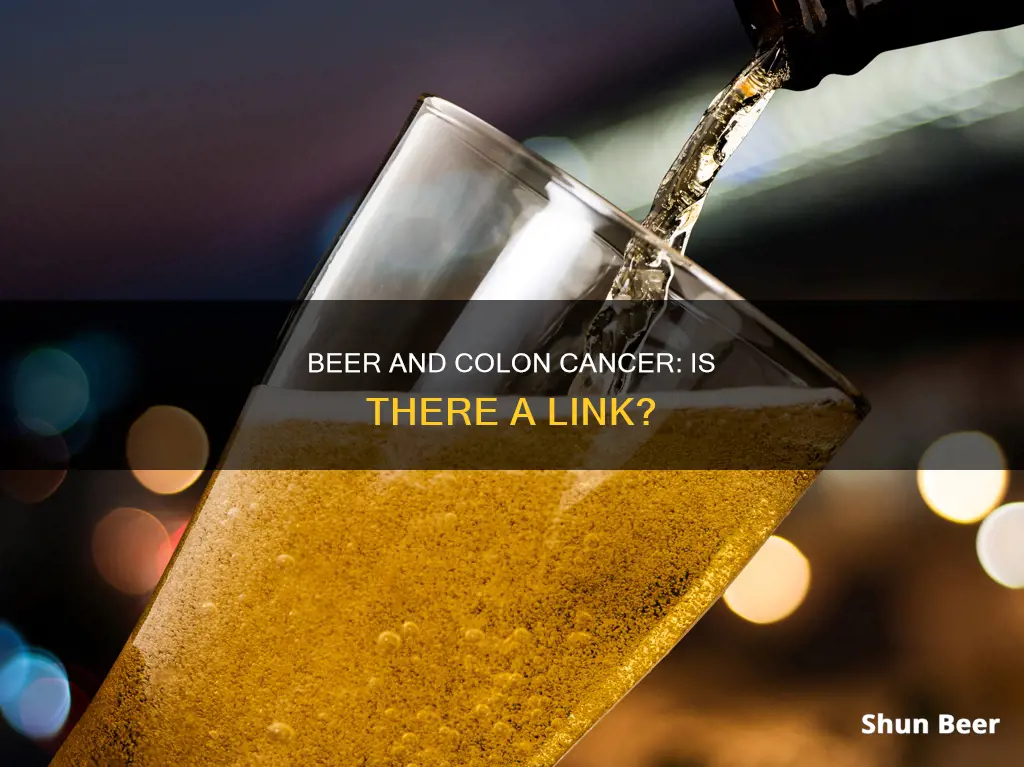
Alcohol is a well-established carcinogen, and drinking it – including drinking beer – is linked to an increased risk of several types of cancer, including colon cancer. Even one alcoholic drink per day can elevate cancer risk, and this risk increases with greater alcohol consumption over time. Moderate to heavy drinkers increase their risk of colon cancer by 1.2 to 1.5 times compared to non-drinkers.
The ethanol in alcoholic drinks is broken down by the gastrointestinal tract to produce toxic substances like acetaldehyde, which can damage DNA in cells in the colon and rectum, causing them to replicate uncontrollably and form a tumour. Ethanol may also cause changes to the gut microbiome that result in bowel inflammation and the activation of enzymes that make someone more susceptible to developing cancer.
| Characteristics | Values |
|---|---|
| Alcohol consumption and colon cancer | There is a link between alcohol consumption and colon cancer. Alcohol is a well-established carcinogen that increases the risk of several types of cancer, including colon cancer. The risk of developing colon cancer increases with each glass of alcohol consumed. |
| Beer consumption and colon cancer | Beer contains ethanol, which is the type of alcohol found in alcoholic drinks. Beer drinkers who consume more than 14 drinks of beer and spirits a week have an increased risk of rectal cancer compared to non-drinkers. |
| Risk factors | The risk of developing colon cancer is higher for heavy drinkers, and it increases with the amount of alcohol consumed over time. Even one alcoholic beverage per day can elevate the risk of cancer. |
| Prevention | It is recommended that individuals who do not drink alcohol should not start, and those who do drink should limit their consumption to no more than 2 drinks per day for men and 1 drink per day for women. |
| Other health effects of alcohol | Alcohol can cause short-term effects such as changes in mood, concentration, judgment, and coordination. Long-term effects include liver damage, damage to the pancreas and brain, increased blood pressure, and a higher risk of heart disease and stroke. |
What You'll Learn

Beer and colon cancer risk
Drinking beer can increase the risk of colon cancer. Alcohol is a well-established carcinogen, and even one alcoholic beverage per day can elevate the risk of cancer. The risk increases with the amount of alcohol consumed over time.
Alcohol and Cancer
Alcohol is a leading modifiable risk factor for cancer, yet many people are unaware of its carcinogenic effects. According to the National Institute on Alcohol Abuse and Alcoholism, a standard alcoholic drink in the US contains 14 grams of pure alcohol. This amount of alcohol is typically found in 12 ounces of beer. The federal government's Dietary Guidelines for Americans recommend that individuals who do not drink alcohol should not start, and those who do drink should limit their consumption to no more than two drinks per day for men and one drink per day for women.
Link Between Alcohol and Colon Cancer
Multiple studies have found a connection between alcohol consumption and colorectal cancer. The risk of developing colon cancer increases with each glass of alcohol consumed, and this link is stronger for heavy drinkers. The breakdown of ethanol in alcoholic drinks can generate toxic substances like acetaldehyde, which can damage the DNA of cells in the colon and rectum, leading to uncontrolled cell growth and the formation of tumors.
Beer Consumption and Colon Cancer Risk
A Danish population-based cohort study investigated the relationship between alcohol type and amount and the risk of colon and rectal cancer. The study found a dose-response relationship between alcohol and rectal cancer, with drinkers of more than 41 drinks per week having a relative risk of 2.2 compared to non-drinkers. However, no association was found between alcohol and colon cancer.
Another study from Australia also found that moderate drinkers of beer (two glasses per day) had an increased risk of bowel cancer compared to occasional or non-drinkers.
Reducing Risk
Reducing alcohol intake is one of the best ways to lower the risk of colon cancer. Most studies suggest that cancer risk declines once an individual stops drinking alcohol, although it may take years for the risk to decrease to the level of someone who has never drank heavily.
Beer and Lipitor: Safe Mix or Health Risk?
You may want to see also

Alcohol's role in colon cancer
Alcohol is a well-established carcinogen that increases the risk of several types of cancer, including colon cancer. Even one alcoholic drink per day can increase the risk of developing cancer, and this risk increases as a person consumes more alcohol over time. Moderate to heavy drinkers increase their risk of colon cancer by 1.2 to 1.5 times compared to non-drinkers.
Alcohol is broken down by the gastrointestinal tract into toxic substances like acetaldehyde, which can damage the DNA of cells in the colon and rectum. This damage can cause cells to replicate uncontrollably and form a tumour. Ethanol may also cause changes to the gut microbiome, leading to bowel inflammation and the activation of enzymes that make an individual more prone to developing cancer.
The link between alcohol consumption and an increased risk of colon cancer has been observed in multiple studies. A 2019 review of 16 studies found that the link between alcohol consumption and colorectal cancer followed a J-curve, with higher amounts of alcohol causing higher rates of colorectal cancer. Another study of over 5.6 million people in South Korea found that light drinkers had a 9% higher risk of developing colorectal cancer than non-drinkers, while heavy drinkers had a 20% higher chance.
The type of alcoholic beverage consumed also appears to play a role. A Danish population-based cohort study found a strong association between alcohol intake and rectal cancer, with drinkers of more than 41 drinks per week having a relative risk of 2.2 compared to non-drinkers. However, when wine was included in the alcohol intake, the risk was reduced.
In summary, alcohol consumption is a significant risk factor for the development of colon cancer, with the risk increasing with heavier and more frequent drinking. Reducing alcohol consumption may help lower the risk of developing colon cancer, but it may take many years for the risk to decrease to that of a non-drinker.
Vegan-Friendly Beer in Australia: What to Drink
You may want to see also

The effect of drinking beer on the colon
Drinking beer can have a significant impact on the colon, and there is a clear link between alcohol consumption and an increased risk of developing colon cancer. Here is a detailed overview of the effects of drinking beer on the colon:
Increased Risk of Colon Cancer
Multiple studies have established a strong connection between alcohol consumption and the development of colorectal cancer. This risk increases with higher alcohol intake, and even moderate drinkers are at a higher risk. Beer, as an alcoholic beverage, contributes to this elevated risk. A study in Denmark found a positive correlation between alcohol intake and rectal cancer, with those consuming more than 14 drinks of beer and spirits per week facing a higher risk.
Damage to the Colon
The ethanol in alcoholic drinks is broken down by the gastrointestinal tract, producing toxic substances like acetaldehyde. These toxins can damage the DNA of cells in the colon and rectum, causing uncontrolled cell replication and the formation of tumors. Ethanol may also disrupt the gut microbiome, leading to bowel inflammation and the activation of cancer-causing enzymes.
Impact on the Microbiome and Inflammation
The consumption of beer and other alcoholic drinks can alter the gut's microbiome, or the community of microorganisms living in the digestive tract. This disruption can lead to bowel inflammation and changes in enzyme activity, making individuals more susceptible to developing cancer.
Interaction with Other Risk Factors
Drinking beer, when combined with other risk factors, can further increase the chances of developing colon cancer. For example, drinking and smoking together elevate the risk of cancers in the mouth, throat, and esophagus. This is because alcohol helps harmful chemicals in tobacco enter the cells lining these areas and may hinder their ability to repair DNA damage caused by tobacco.
Effect on Nutrient Absorption
Alcohol consumption may also impact the body's ability to absorb essential nutrients like folate, a vitamin necessary for maintaining healthy cells. This impaired absorption can contribute to the risk of developing colon and other types of cancer.
Weight Gain and Obesity
Excessive beer consumption can contribute to weight gain and obesity, which are known risk factors for various types of cancer, including colon cancer.
In summary, drinking beer can have detrimental effects on the colon, primarily by increasing the risk of colon cancer. The ethanol in beer damages the DNA of colon cells and disrupts the gut microbiome, leading to inflammation. Beer consumption interacts with other risk factors, such as smoking, and impairs nutrient absorption, further elevating the chances of developing colon cancer. Therefore, it is essential to drink in moderation or abstain from alcohol to reduce the risk of colon cancer and promote colon health.
Breastfeeding and Beers: How Many Are Safe?
You may want to see also

How beer drinking affects the body
Alcohol is a well-established carcinogen that increases the risk of several types of cancer, including colon cancer. Even one alcoholic beverage a day can elevate your cancer risk, which increases as you consume more alcohol over time.
Increased Risk of Colon Cancer
Moderate to heavy drinkers (more than three drinks per day) have a 1.2 to 1.5-fold higher risk of developing colon and rectal cancers compared to non-drinkers. The risk is generally stronger in men than in women, but studies have found this link in both sexes.
Damage to Body Tissues
Alcohol can irritate the mouth and throat, and the resulting cell damage may lead to DNA changes that increase the risk of cancer.
Conversion to Acetaldehyde
Once in the body, alcohol is converted into acetaldehyde, a chemical that damages DNA inside cells and has been shown to cause cancer in lab animals.
Oxidative Stress
Drinking alcohol can lead to oxidative stress in cells, causing them to create more reactive oxygen species. These molecules can damage cells and increase the risk of cancer.
Effect on Nutrient Absorption
Alcohol may affect the body's ability to absorb nutrients like folate, which is important for cell health. Low folate levels may play a role in the risk of colorectal cancer.
Increased Estrogen Levels
Alcohol raises estrogen levels, which is linked to an increased risk of breast cancer.
Weight Gain
Alcohol adds extra calories to the diet, contributing to weight gain. Being overweight or obese increases the risk of many types of cancer.
Liver Damage
Heavy drinking can cause inflammation and heavy scarring in the liver, leading to liver failure.
Increased Blood Pressure and Risk of Heart Disease
Excessive alcohol consumption can raise blood pressure and increase the risk of heart disease and stroke.
Negative Impact on Fetal Development
Alcohol consumption during pregnancy, especially heavy drinking, may lead to birth defects or other problems with the fetus.
Beer and Gastritis: What You Need to Know
You may want to see also

Preventing colon cancer
Colon cancer is one of the only preventable cancers, as screening can be diagnostic and therapeutic. The U.S. Preventive Services Task Force suggests adults at average risk of colon cancer should begin screening at age 45, but those with a family or personal history of colon polyps or cancer should be screened earlier.
- Reduce alcohol consumption or stop drinking alcohol altogether. Alcohol is a well-established carcinogen, and even one alcoholic drink per day can increase your risk of colon cancer. The risk increases as you consume more alcohol over time.
- Get screened regularly from the age of 45. Screening can help identify small growths called polyps, which can turn into cancer, before they develop into tumours.
- Increase your physical activity and maintain a healthy weight.
- Avoid tobacco.
- Make dietary changes, such as reducing your consumption of red meat and processed meats, and increasing your intake of fresh fruit, vegetables, and fibre.
- Limit your alcohol consumption to no more than two drinks per day for men and one drink per day for women.
Beer and Sex: A Match Made in Heaven?
You may want to see also
Frequently asked questions
Alcohol is a well-established carcinogen, meaning it increases the risk of developing several types of cancer, including colon cancer. The more alcohol a person drinks, the higher their risk of cancer. Beer, like other alcoholic drinks, contains ethanol, which can be broken down into toxic substances such as acetaldehyde that can damage DNA in the cells of your colon and rectum, leading to cancer.
Even one standard drink per day (10 grams of alcohol) can increase the risk of colon cancer. Moderate drinkers (two glasses of beer per day) have been found to have a higher risk of bowel cancer compared to occasional or non-drinkers.
Yes, the link between alcohol consumption and colon cancer is stronger in men than in women, according to some studies. Additionally, people with a family history of colorectal cancer may have a higher risk when consuming alcohol.
According to dietary guidelines, individuals who do not drink alcohol should not start. For those who choose to drink, it is recommended to limit consumption to no more than two drinks per day for men and one drink per day for women. It is important to note that the optimal number of drinks to minimize overall health risk is zero.







